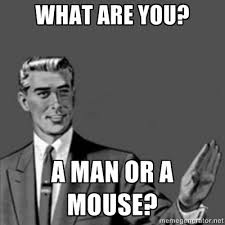|
From the vault of my personal experience
“Son, are you a man or a mouse?” These few words were delivered to me by my dad every time I got a bit too weepy as a little boy. Growing up in the 50’s and 60’s, it was not wise for little boys to show too many traits of emotional sensitivity. Might look like a sissy, if you know what I mean. So, my father would chide me with this little question and I would abruptly stop my sensitive ways and buck up and act like the little man I was supposed to be. This fit nicely into the Southern faux paradigm of manliness and toughness of which he and so many men of his generation subscribed. Hence, began a lifelong chorus of hearing: “you’re too sensitive”, “man up”, “toughen up” and “grow a pair.” Hearing this repeatedly, from males and females, makes one doubt, whether one is man enough to be a real man. After all, real men don’t eat quiche. And what is a real man? As the years went by, I began to shield myself from this type of criticism by trying to live the manly life, I was taught to live. But it always felt a bit disingenuous and inauthentic. The older I got, the more I began to realize that what I was, no less a man, because I could feel deep emotion, get in touch with my inner core, and freely express the emotion within. When I began to read about the highly sensitive personality type, I felt vindicated and liberated. Dr. Elaine Aron gets a lifetime achievement award from me. And I’m sure a lot of HSMs feel the same way. The Male Sensitivity Spectrum – where do you fall? When I first started googling this topic, I was looking for male sensitivity and found that the first page or two of the search was focused on penile sensitivity. Interesting, but not what I had in mind here. But, I suppose there is some metaphorical tie-in too obtuse for me to elaborate on. Is there a sensitivity spectrum within HSMs? Are some HSMs more sensitive than others, more prone to emotional display or sensory overload, than say, other HSMs. I for one believe there is some truth to this. I mean after all we are all individuals and science does account for individual differences. We may have the same predisposition for an active amygdala, but perhaps the signals get muffled more so in some than others. Maybe there some broad gradation starting with a threshold HSM, who is lowest on the scale of HSM sensitivity, a moderate HSM that straddles the wide middle, and a high HSM, that is bordering on hypersensitivity. This could explain some of the diversity in HSM capacity and expression of that sensitivity. I know all HSMs are not what the general population would peg high sensitivity to be. Of course, no one is better nor worse than the other, just a way to stratify further the traits of HSPs. Might explain why some HSMs weep at sad movies, while others just get the obligatory lump in the throat and wet eyes. In any case, regardless of where you fall on the spectrum, if you are an HSM, you are a man with fully functioning tear ducts. Be proud of that. This still remains about sensing capability, our high capacity to sense our world. It’s the inputs that affect us so. Sensitivity is the reaction to that sensing, and perhaps this sets us apart from our non-HSP fellows. So whether it is sights, sounds, smell, taste or touch, or even the unconscious sense of intuition, we are always sensing deeply. And it will always affect us deeply. And, yes, we react sensitively and passionately. Yet, we HSMs are still men and that’s okay that we broaden the masculine definition. A world that values machismo among the menfolk Fitting into a world that values machismo, the hyper male, and toughness is always going to be a struggle for HSMs. The ridiculous focus on aggressive and dominant behavior, which is often seen as being the epitome of masculinity in our culture, naturally divorces the American male from the emotions that are native to all humans. This separation begins in childhood. The boy is expected to be the ideal and anything less is considered, well, effeminate. In other words, you no longer are a male, unless you reflect a set of traits that would be better suited for 10,000 B.C. than the twenty first century. You can see this in our militaristic, warrior archetype that is reflected throughout our society in board rooms, bedrooms and now bathrooms. We are still fighting imaginary wars every day at work, at home and at play. Even some women have adapted to this model to succeed in this dysfunctional paradigm. We have lost touch with reality. We no longer even know what toughness is anymore. It’s an ideal brush stroked from a cartoon hero we see in the movies or on television. When you elect action heroes and cowboys as governors and presidents, it’s not real anymore. This is then passed on from one generation to the next, effecting millions of young men and really damaging young HSMs, who feel they don’t fit in or worse yet aren’t real men. Our politicians, our athletic heroes, our matinee idols, mostly don’t know what real toughness, character, courage or mettle is anymore. It’s just not real life, folks. And we have to stop worshiping this ideal. It benefits no one, not even non-HSMs. So where does the sensitive masculine male fit in Our world is very troubled. Just watching the news, the political discourse this year, the racial divides, the wars, the poverty and all the detritus that swirls around this world, makes me think that there has never been a time when HSPs and HSMs need to find and be in our place in this world. We are likely on the verge of our first female president, following on the heels of our first African American president, who was in my opinion an HSM. It’s a time that is ripe for a shift away from the machismo politics of the Reagan Republican brand and back to a more compassionate, empathic form of government. If this shift fails to take hold, I fear we are heading for a dark place as a culture and as a people. The HSP is often the canary in the mine shaft. Pay attention world. We are uncomfortable in this manufactured male macho world that generally insecure and paranoid males have created. We as HSMs need to assert ourselves in a distinct HSM way, and penetrate the corporate ranks, the world of politics, religion, art and journalism and serve as new role models for men everywhere. It is our sensing nature that will help change this world and as men we can help reshape the balance of things. We need to do something challenging for us – stand out. Since most of us will not be in politics or will be religious leaders, we can start somewhere closer to home. At work HSMs are not always in leadership roles, especially at work. We tend to work in the background, quietly and diligently doing our work, getting along, being good soldiers. But, I think it’s time to start talking about change in the workplace. HSPs are generally the first to detect toxic work environments and need to speak out about conditions that we sense first are not conducive to productivity. That is our prime objective as the alert mechanism to the larger group. We need to start talking about being HSPs and explaining to our managers and co-workers and Human Resources that we may have some different requirements to be at our best. The research shows that a lot of what we find necessary for a good productive work environment is similar to what our non-HSP coworkers also find important. And when given the opportunity we need to accept leadership roles and promote a more cooperative and empathic work place. HSM males can model this new paradigm for a more compassionate, caring male that may shift all that yang energy to balance with the feminine yin energy. That can easily filter within the entire organization. Sounds new-agey, well, maybe so, but science says that we are energy and the polarity has been imbalanced for a long time now. Is there a time to suck it up and play the old role model? In word, maybe. I believe in balance. We as HSMs can’t always be about feeling our pain, expressing emotional outpourings and living in flight or fight all the time. Sometimes, we need to “suck it up”, which just means being willing to adapt, stay fluid and flow with the energy around us. We often retract at negativity and recoil or retreat, but sometimes staying authentic means letting the storm blow around you, putting away the protective umbrella and let the rain fall in your face. Sure, you get wet, but you don’t drown, regardless of how you feel. Sometimes you’re the man, sometimes you’re the mouse. But, remember, the man doesn’t have to be unemotional and stoic. Courage and bravery come from a deep place within us all. Ride the wave, do one brave thing and never trust a man that doesn’t cry. Adieu. Thanks for dropping by, until next week… References: hsperson.com/faq/hs-or-asd/ www.psychologytoday.com/articles/201107/sense-and-sensitivity www.huffingtonpost.com/andrew-cotto/america-has-a-macho-probl_b_2468374.html highlysensitiveperson.net/highly-sensitive-men/ www.alternet.org/labor/how-does-highly-sensitive-person-survive-hell-american-workplace
0 Comments
Leave a Reply. |
AuthorBill Allen currently lives in Bend, Oregon. He is a certified hypnotist and brain training coach at BrainPilots.com. He believes that male sensitivity is not so rare, but it can be confounding for most males living in a culture of masculine insensitivity which teaches boys and men to disconnect from their feelings and emotions. His intent is to use this blog to chronicle his personal journey and share with others. Archives
July 2024
Categories
All
|



 RSS Feed
RSS Feed
